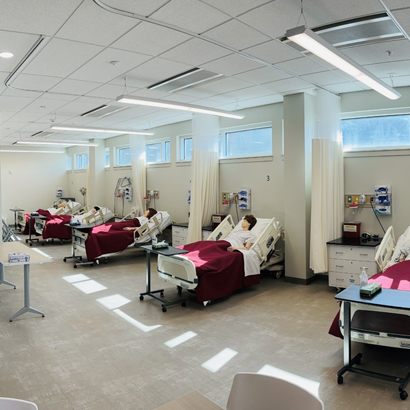Nursing

As the guiding principle for the Missoula College Nursing Program, the mission statement is to provide an accessible, student-centered learning environment through creative educational and clinical opportunities. Students receive a high-quality nursing education which prepares graduates for today's practice as competent and caring nurses who assist in meeting the diverse health care needs for local and global communities.
The Missoula College Nursing Program aligns with the UM Priorities for Action through five core themes:
-
Creating a supportive environment where students are mentored by knowledgeable faculty and empowered to reach their full potential. This objective is aligned with Priority 1, placing student success at the center of all we do;
-
Promoting the development of knowledge and skills necessary for the intellectual, professional, and personal growth of students. This objective is aligned with Priority 2, driving excellence in innovation, teaching and learning;
-
Developing partnerships with local and regional healthcare facilities to establish a variety of learning opportunities and provide exposure to diverse populations. This objective is aligned with Priority 4, Partner with Place. We have robust partnerships with area healthcare facilities which enables our students to gain a wide variety of clinical practice.
-
Acknowledging the necessity for lifelong learning and providing nursing education pathways to BSN or higher. This objective is aligned with Priority 1, placing student success at the center of all we do. We highly encourage our graduates to pursue a BSN completion program after graduating with their ASN;
-
Fostering discovery and creativity, critical thinking skills, and competencies at the associate degree nursing entry level. This objective is aligned with Priority 2, driving excellence in innovation, teaching and learning.
Nursing Program Outcomes
-
The program’s annual licensure examination pass rate will meet or exceed the national average for first-time test takers for the NCLEX-RN (National Council Licensure Examination for Registered Nurses).
-
At least eighty percent (80%) of students who start on the first day of NRSG 230 in the traditional RN program will graduate within four semesters or two academic years.
-
At least eighty percent (80%) of LPNs admitted into the traditional program who start on the first day of NRSG 236 will graduate within three (3) semesters or one-and one-half (1 ½) academic years.
-
At least eighty percent (80%) of LPNs admitted into the LPN-to-RN Bridge program who start on the first day of NRSG 254 will graduate within one (1) rolling year.
-
At least ninety percent (90%) of alumni surveys returned will demonstrate graduates who are actively seeking employment have secured an RN position within 12 months.
The Missoula College ASN program has adopted the QSEN (Quality and Safety Education in Nursing) competencies as a framework for our End of Program Student Learning Outcomes. The goal of the QSEN project is to prepare future nurses with the knowledge, skills and attitudes (KSAs) needed to improve the quality and safety of patient care. The six QSEN competencies are: Patient-Centered Care, Teamwork and Collaboration, Evidence-based Practice (EBP), Quality Improvement (QI), Safety, and Informatics. www.QSEN.org
Upon successful completion of the Associate of Science Nursing Program, the graduate will be able to:
-
Demonstrate compassion and professionalism while delivering personalized and culturally sensitive nursing care.
-
Provide patient safety through risk reduction and error prevention strategies.
-
Apply effective communication strategies when working with clients, families, and members of the health care team to foster an environment of mutual respect and collaborative decision-making.
-
Apply current evidence-based research to provide quality nursing care.
-
Utilize data to improve health care practices that positively impact patient outcomes.
-
Utilize information and technology to coordinate and deliver safe care.
-
Demonstrate clinical judgment within the nursing process.
Nursing is an incredibly diverse and rewarding career. Nurses are an essential element of the healthcare system, and demand continues to grow across Montana and the U.S. The Registered Nursing program at Missoula College UM prepares students to take the National Council Licensure Exam (NCLEX-RN) and enter the workforce as skilled and competent entry-level nurses. Once graduates have successfully passed the NCLEX, they may be eligible to apply for licensure by endorsement in any of the 50 states. Montana is one of 34 states who belong to the Nurse Licensure Compact (NLC). Under the NLC, nurses can practice in other NLC states, without having to obtain additional licenses. Information about the NLC and the participating states can be found on their website.
For further information, please refer to the website for the National Council of State Boards of Nursing (NCSBN). To assist nurses, and especially new graduates, in learning where they would need a license, the NCSBN has developed the Nurse Licensure Guidance tool. Once a nurse submits their information, the tool quickly displays where they would need licenses and points to helpful resources of how to move forward.
If you are considering working outside of Montana after graduating from a Montana nursing program, please do your research.





